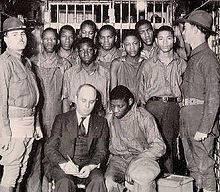The Scottsboro Boys were nine black teenagers accused of rape in Alabama in 1931. The landmark set of legal cases from this incident dealt with racism and the right to a fair trial. The case included a frameup, an all-white jury, rushed trials, an attempted lynching, an angry mob, and is an example of an overall miscarriage of justice.
On March 25, 1931, several people were hoboing on a freight train traveling between Chattanooga and Memphis, Tennessee. Several white teenagers jumped off the train and reported to the sheriff that they had been attacked by a group of black teenagers. The sheriff deputized a posse, stopped and searched the train at Paint Rock, Alabama, arrested the black teenagers, and found two young white women who accused the teenagers of rape.
The case was first heard in Scottsboro, Alabama in three rushed trials, where the defendants received poor legal representation. All but thirteen-year-old Roy Wright were convicted of rape and sentenced to death, the common sentence in Alabama at the time for black men convicted of raping white women. But with help from the American Communist Party, the case was appealed.
The Alabama Supreme Court affirmed seven of the eight convictions, and granted thirteen-year-old Eugene Williams a new trial because he was a juvenile. Chief Justice John C. Anderson dissented, however, ruling that the defendants had been denied an impartial jury, fair trial, fair sentencing, and effective counsel. While waiting for their trials, eight of the nine defendants stayed in Kilby Prison.
The case was returned to the lower court and the judge allowed a change of venue, moving the retrials to Decatur, Alabama. Judge Horton was appointed. During the retrials, one of the alleged victims admitted fabricating the rape story and asserted that none of the Scottsboro Boys touched either of the white women. The jury found the defendants guilty, but the judge set aside the verdict and granted a new trial. After a new series of trials, the verdict was the same: guilty. The cases were ultimately tried three times. For the third time a jury—now with one black member—returned a third guilty verdict. Charges were finally dropped for four of the nine defendants. Sentences for the rest ranged from 75 years to death. All but two served prison sentences. One was shot in prison by a guard. Two escaped, were charged with crimes, and were sent back to prison. Clarence Norris, the oldest defendant and the only one sentenced to death, escaped parole and went into hiding in 1946. He was pardoned by George Wallace in 1976 after he was found, and wrote a book about his experiences. Norris, the last surviving defendant, died in 1989.
On November 21, 2013, Alabama’s parole board voted to grant posthumous pardons to the Scottsboro Boys.
“The Scottsboro Boys”, as they soon became known, were defended by many in the North and attacked by many in the South. The case is now widely considered a miscarriage of justice that eventually produced the end of all-white juries in the South. The case has inspired and has been examined in literature, music, theatre, film and television.
